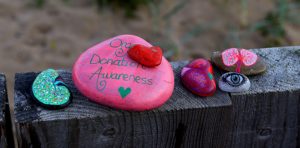So that was another Organ Donation Week. Pink things all over England, Scotland, Wales and Northern Ireland. Buildings, bridges and natural features lit up in pink, football teams in pink jerseys, dancing for donors, giant banners displayed at iconic sites. Clocking up miles in walks, runs, swims, and cycle rides, in the Race for Recipients. And many stories, stories of lives on the edge, of generous donors and families, of lives transformed, of laughter and joy returned.

Depending on your social media algorithms you might think the whole country was either involved or directly connected to it all in some way.
Well, yes, and no…
Time after time our conversations about organ donation suggest we may all be closer to it than we are conscious of. So many people know someone – a relative, a friend, a neighbour, a work colleague, someone in the school, the street, somewhere – who had a transplant, or needs one, was a donor, is a living donor, is on dialysis, or is in some other way closer to the experience of organ transplantation than we usually talk about. It’s never very far away, though it may not yet be close enough to make us stop and think.
In all that mix, some choose to be living donors. Usually driven by their love for someone close to them, by the need to save life by donating a kidney or part of their liver. The shared emotions of successful transplants and lives restarted are rich reward.
In smaller numbers are altruistic, non-directed donors; those who choose to donate (usually) a kidney to someone they don’t know, and probably never will.
And yet, for all that, only one per cent of us – only one per cent – are likely to die under circumstances that may allow us to be considered as possible organ donors. And not all of that one per cent will have thought about being a donor, or have let their families know about their preferences. Even then, not every family in those difficult circumstances will find it easy to make a decision.
That’s one reason why donors are so precious. For all of us who would be willing, a very small few could ever be chosen.
And that’s why these conversations are so important. And it’s why we bang on about them so much… Why we help turn the scene pink for a little while, tell each others’ stories about the incredible transformation transplants can bring; lives restarted, friendships continued, donors and their families honoured in their grief, and profoundly, always, remembered with gratitude.
This week, we hope, will have helped start, and inform, some conversations about organ donation. If you helped that happen, thank you. And who knows, it may be that somewhere a conversation has just happened that could save the life of someone you love, or even your own…

Live Loudly Donate Proudly
